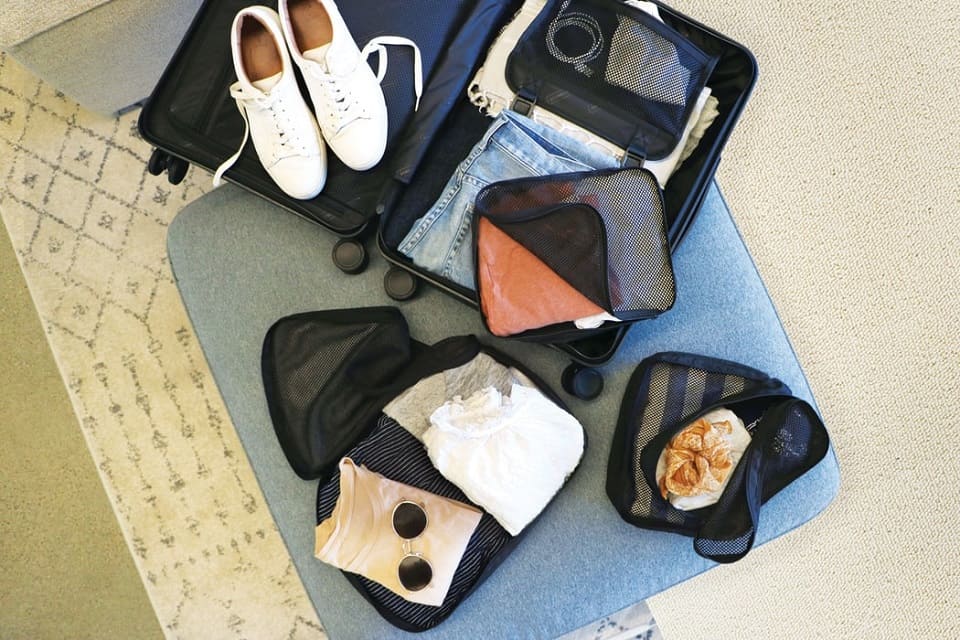This is possibly the most important question that a digital nomad can ask and it’s best asked before you begin your journey. A digital nomad works and travels, that’s the definition of what it is to be a digital nomad but is it easy to do remote work and travel?
Yes, it can be very easy to do remote work and travel, as long as you attend to some simple practices while you do: travel slowly, pack for work, research your destination, over-communicate with the office, have a work routine, separate work and life physically and stay fit and eat well.
Let’s take a look at each of those things in more detail:

Table of Contents
Travel Slowly – This Isn’t A Vacation
Possibly the biggest “noob” error when trying to remote work and travel is treating the trip as a backpacker-style gap year. That is booking a new destination every 2-3 days or even every week.
This is exhausting and can lead to a total nervous breakdown if you try to do it for long enough.
The issues here are:
- You’re spending a lot of time in transit – time you can’t spend on work
- You’re spending a lot of time doing things in each location – time you can’t spend on work
- You’re moving too fast to make friends – which results in a lack of emotional support
- It only takes a small delay to ruin your day – when you’re trying to make the most out of every hour of the day, getting stuck waiting for a plane for 8 hours with only lousy airport Wi-Fi to rely on can completely destroy your productivity and make it impossible to recover from
If you want to make things work, you need to slow down. You’re going to be working for a good chunk of each week, you want to see new places and experience new things (which adds more time) and you don’t want to come home with your strongest memory being how cramped and impossible it is to work from a bus seat going from Cambodia to Vietnam.
We’d recommend that you spend a minimum of 1 month in any given destination and that 3-6 months is probably best when you get into the swing of things.
Pack For Work – You’re Not A Slave To One Bag Conventions

The whole “one bag” routine feels more like an elitist club than anything of value. When you work and travel, you need to be set up to work. You may be able to hack the occasional day typing on an iPad screen or using the trackpad on your laptop instead of a mouse but it’s not sustainable.
Think about what you need to get the job done and then take that with you. In fact, it ought to be the first priority when you’re packing: hard drives, headset, microphone, video equipment, mouse, decent sized laptop (again an 11” screen might be light but it’s next to useless for most kinds of real work)
Nobody will ever know or care that you’re not traveling with just a carry on bag. Megan and I lug 4 suitcases and 2 carry on bags everywhere we go. You only know that because I just told you (or because you’ve read other articles on this blog). It’s not a big deal.
Research Your Destination – Preparation Is Important
Most of the major disasters that digital nomads encounter when trying to do remote work on the road stem from complete ignorance of their proposed destination. They’ve failed to understand that a city is not a 24-hour city, for example, and their plan to work all through the night is stymied by the fact they booked a dorm room in a hostel and there’s not a single co-working space they can work in without buying a year’s membership to get a swipe card.
This doesn’t need to happen. You can Google your destination and determine where the nearest places you might want to work in are. You can find out when they’re open. You can talk to the hotel/apartment/hostel you book and see if their Wi-Fi is reliable and if there’s a desk you can use.
You can check to see if there are any travel warnings regarding hardware you carry (both Samsung and Apple equipment have been either temporarily or permanently banned from flights in certain regions over the last few years).
And so on…
We’d also suggest taking a close look at a place and deciding whether it’s really somewhere you will enjoy. The number of people who end up in Chiang Mai bitching about the city’s terrible nightlife is pretty hilarious considering that every blog piece ever written about that city notes that it has no late-night scene.
Over Communicate With The Office
There’s no such thing as over-communicating when it comes to remote work. Your colleagues, your boss, your clients, etc. would all rather hear from you than not. It’s also worth noting that there’s nothing like the fact that they know you’re in Vietnam or in Argentina to fuel a little jealousy and a lot of concern that you might no longer be pulling your weight.
So, check in and check in a lot. Show that you’re still available to do the work and that the work is getting done. Make sure to arrange meetings with people to discuss how things are going and to, subtly, blow your own trumpet about your achievements.
You’ll find that remote work and travel go much better together when everyone back home is still convinced that you’re on top of your game and not on the beach sipping cocktails when you ought to be working.
Try To Develop A Work Routine
We’d suggest that you always have a “work routine” and that you try to stick to it as best as you can. I like to get up early, in fact as I type this Megan is still fast asleep, and get working. I find it easier to think in the early day and my mid-late afternoon, I am falling asleep on my feet.
You can choose whatever routine works for you and the people you’re working for in your remote job. When you know that you’re going to work from 9 to 5 or 12 to 9 or whatever, you can plan the rest of your time around that.
A routine helps you stay reliable for your employer, but it also separates work from “real life”. It gives you a time when you can stop work and go and enjoy your life in your current home.
Try To Separate Work From Life Physically
I always try to rent a one-bedroom apartment even though Megan and I can comfortably fit (with all our stuff) in a small room or a studio. I go for apartments because it means that I can work somewhere different from where I sleep.
If I work in a bedroom for too long, I start to feel like I’m going a bit crazy, work and my personal life become the same thing and it’s impossible to know where one ends and the other begins. Megan deserves better than that from me and I think I deserve better than that too.
Working remotely should be good for you but you need to take responsibility for that and that often means you need to carve out a space for work that doesn’t interfere with the rest of your life.
If you can’t get that at home – maybe a café or a co-working space can help take the load off (at least some of the time)?
Try To Stay Fit And Eat Well

Yes, I am quite aware that I am overweight (fat, you might say in unkinder times) but I wish that I hadn’t let myself get into this state. I do, however, exercise every day and am working on getting my diet in check.
Even though I am overweight, it’s clear to me that on the days that I exercise that I feel more alive and more capable than when I don’t. I am entirely clear that if I wasn’t overweight, life would be easier in a myriad of different ways.
Set aside time in your day to exercise (at least 30 minutes of moderate exercise a day) and to eat healthier meals. Sure, it can be challenging when you first arrive somewhere new to know where to go to get food, etc. but that’s part of the joy of travel. Google is your friend.
Conclusion
It’s not hard to do remote work and travel if you think about what you’re trying to achieve. As you can see from our tips above, you just need to manage your travel, work and personal wellbeing with a little care and attention.
Then you can see the world and work wherever you want to without putting your job at risk or worse, risking burnout.
